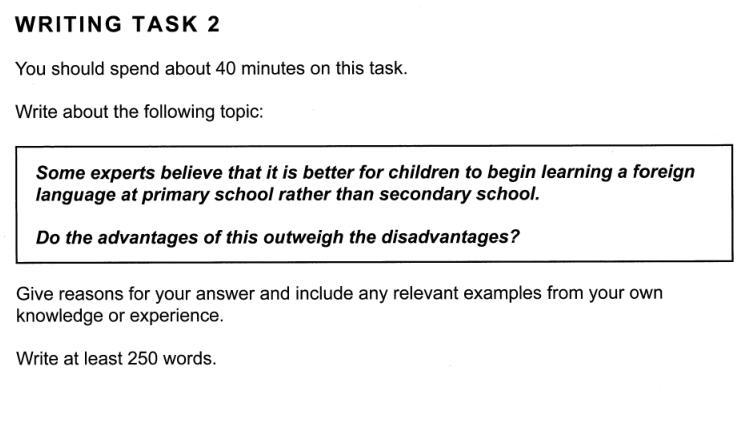剑桥雅思9 Test1写作Task2考官范文&翻译
今天的话题:孩子什么时候开始学习英语,利是否大于弊。

剑9 test 1 task2
Traditionally, children have begun studying foreign languages at secondary school, but introducing them too earlier is recommended by some educationalists. This policy has been adopted by some educational authorities or individual schools, with both positive and negative outcomes.
The obvious argument in its favour is that young children pick up languages much more easily than teenagers. Their brains are still programmed to acquire their mother tongue, which facilitates learning another language, and unlike adolescents, they are not inhibited by self-consciousness.
The greater flexibility of the primary timetable allows for more frequent, shorter sessions and for a play-centred approach, thus maintaining learners’ enthusiasm and progress. Their command of the language in later life will benefit from this early exposure , while learning other languages subsequently will be easier for them. They may also gain a better understanding of other cultures.
There are, however, some disadvantages. Primary school teachers are generalists, and may not have the necessary language skills themselves. If specialists have to be brought in to deliver these sessions, the flexibility referred to above is diminished. If primary language teaching is not standardised, secondary schools could be faced with a great variety of levels in different languages within their intake, resulting in a classroom experience which undoes the earlier gains. There is no advantage if enthusiastic primary pupils become demotivated as soon as they change schools. However, these issues can be addressed strategically within the policy adopted.
Anything which encourages language learning benefits society culturally and economically, and early exposure to language learning contributes to this. Young children’s innate abilities should be harnessed to make these benefits more achievable.
孩子传统上从中学开始学习外语,但一些教育家建议可以更早开始学习。这一政策已经被一些教育当局或一些学校使用,结果有利有弊。
支持这一政策的显而易见的论据是小孩子学语言与青少年相比容易得多。他们的大脑依然习惯于获取他们的母语,这有助于学习另一门语言,而且他们不像青少年,没有自我意识约束。
小学课程表的更大弹性允许上课时间更频繁,更短暂,而且学习方法以游戏为中心,因此可以保持学习者的热情和进步。他们以后的人生中对语言的掌握会受益于对这一语言的早期接触,而随后对其他语言的学习会变得更加容易。他们也可能会对其他的文化有更好的理解。
但也有一些不利之处。小学老师是通才,他们自己不一定具备所需的语言才能。如果需要引进专才来讲授这些课程,上述的灵活性就会削弱。如果小学语言教学没有实现标准化,那么中学可能会面临入学新生掌握不同语言且水平各不相同的情况,会导致以前的收获都白费的课堂体验。如果充满热情的小学生一升学就失去动力的话,那就没有任何好处了。不过这些问题可以在所采取的政策中得到战略性解决。
任何鼓励语言学习的做法都有益于社会,无论是在文化层面,还是在经济层面,而提早接触语言学习有助于实现这一点。应该利用小孩子的先天能力来使得这些好处更加容易实现。